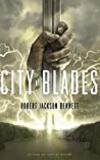
“Welcome to old Voortyashtan,” the captain says with false cheer, waving at the mouth of the Solda. “Though you can’t see much of it these days. It’s moved, y’see, about three hundred feet. Vertically, straight down.” He grins and laughs wickedly.
City of Blades surprised me.
It’s set in the same world as City of Stairs, with fantastic world building full of dead gods and the ravages of war. And we see the main characters again, in particular, Shara, Sigrud, and Mulaghesh. But this time around Mulaghesh is the main character, Sigrud eventually shows up in a slightly less direct role, and Shara is off far away pulling strings, only to show up for a few paragraphs throughout the entire book.
Normally, that’s not something I generally like doing, particularly when I enjoyed the characters as much as I did Shara and Sigrud the first time around. Mulaghesh isn’t nearly as funny and snarky in general and (as we learn throughout the book) has a lot more trauma in her backstory. But she grew on me. By the end, while I would still have been interested to see how Shara would have dealt with the events of the City of Blades, I couldn’t imagine the story having gone that way. Mulaghesh was the perfect protagonist for the story.
A soldier serves not to take, they don’t strive to have something, but rather they strive so that others might one day have something. And a blade isn’t a happy friend to a soldier, but a burden, a heavy one, to be used scrupulously and carefully. A good soldier does everything they can so they do not have to kill. That’s what training is for. But if we have to, we will. And when we do that we give up some part of ourselves, as we’re asked to do.
The new comers (Sigrud’s badass daughter Signe, crazy military sorts General Biswal and Sergeant Pandey, and kind of creepy, traumatized local politician/taxidermist Rada) are fascinating as well. Even if you don’t agree with them, you can see where they’re coming from.
The world building remains fantastic, with a world of (literally) miraculous magic since fallen and torn asunder, a city built by … well …
EMPRESS OF GRAVES
MAIDEN OF STEEL
DEVOURER OF CHILDREN
QUEEN OF GRIEF
SHE WHO CLOVE THE EARTH IN TWAIN
It’s another corner of the world and at once feels like an extension of what we’ve seen before and something alltogether new and dark. Especially when you spend a book dealing with the idea of what happens to an afterlife when gods die…
“Sort of strange, a Continental who doesn’t believe in an afterlife.”
“Perhaps the Divinities made one for us, once,” says Rada. “But they are gone now, aren’t they?”
It’s also interesting to see how technology has advanced:
“I’m not,” he growls. “But these things make it damned easy to kill a man. With bolts, ammunition is so much more of a hassle. Too much wind and you can’t use them at all. Short-ranged, too. With riflings…Overnight, we’ve gone from bolt-action to fully automatic and beyond. Dying has gotten a whole lot easier all over the world.”
And how while they might have electricity, it’s still a learning world:
“Does thinadeskite conduct electricity, Prathda,” Mulaghesh asks, “or does it generate it?” He thinks for a long time. “We…haven’t determined that yet.” “Okay.” “But in a refined state, it…amplifies the charge. Considerably.” Mulaghesh is silent. Prathda shifts on his feet, uncomfortable. “Should that be possible?” she asks. “Well. No.”
Especially when you take divine powers and put them up against modern technology:
“Well, General…This is a half-ton gun. So the weight of the weapon system itself—especially its barrel motor, fuel tank, and optimal ammunition feed—is extraordinary. We’re working to reduce that—engineering makes leaps all the time—but it’s not easy. But there’s also the issue of propulsion and recoil. The PK features state-of-the-art reduced recoil designs, but we’re still talking about six rotating barrels firing about 2,500 rounds a minute. That puts a lot of pressure on its mounting system. We tried one demonstration integrating what we believed to be a heavy enough vehicle to handle the sudden burst of force, but…Well. It started tipping over, and nearly crushed the gunner.” The officer scratched his chin. “In other words, think of this weapon system as an engine that essentially creates a column of lead in the air, moving at speeds up to two hundred feet per second. That should give you an idea of the physics of this weapon.” The instant Mulaghesh pulls the trigger on the PK-512, her understanding of the weapon’s physics grows immensely.
That feeds into to honestly one of the coolest scenes I’ve read. Full stop.
It gets gruesome at time (with a goddess of war and death, you have vivisection1 and blood all over the place), but not hugely worse than City of Stairs.
Overall, it’s a wonderful book once you get into it. It’s not the same thing as a City of Stairs, but it just works. I look forward to seeing how City of Miracles goes.
A wonderful word. ↩︎